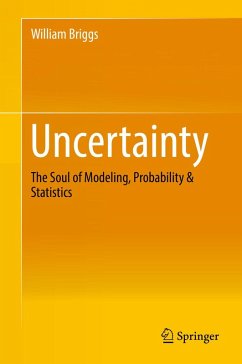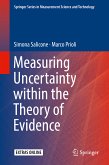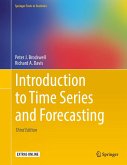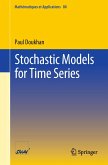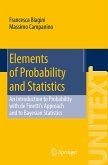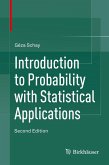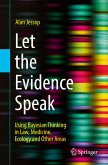The book explains the philosophy of these ideas and not the mathematics, though there are a handful of mathematical examples. The topics are logically laid out, starting with basic philosophy as related to probability, statistics, and science, and stepping through the key probabilistic ideas and concepts, and ending with statistical models.
Its jargon-free approach asserts that standard methods, such as out-of-the-box regression, cannot help in discovering cause. This new way of looking at uncertainty ties together disparate fields - probability, physics, biology, the "soft" sciences, computer science - because each aims at discovering cause (of effects). It broadens the understanding beyond frequentist and Bayesian methods to propose a Third Way of modeling.
- Presents a complete argument showing why probability should be treated as a part of logic
- Broadens understanding beyond frequentist and Bayesian methods, proposing a Third Way of modeling
- Proposes that p-values should die, and along with them, hypothesis testing
William M. Briggs, PhD, is Adjunct Professor of Statistics at Cornell University. Having earned both his PhD in Statistics and MSc in Atmospheric Physics from Cornell University, he served as the editor of the American Meteorological Society journal and has published over 60 papers. He studies the philosophy of science, the use and misuses of uncertainty - from truth to modeling. Early in life, he began his career as a cryptologist for the Air Force, then slipped into weather and climate forecasting, and later matured into an epistemologist. Currently, he has a popular, long-running blog on the subjects written about here, with about 70,000 - 90,000 monthly readers.
Dieser Download kann aus rechtlichen Gründen nur mit Rechnungsadresse in A, B, BG, CY, CZ, D, DK, EW, E, FIN, F, GR, HR, H, IRL, I, LT, L, LR, M, NL, PL, P, R, S, SLO, SK ausgeliefert werden.
"This is a book about probability and probabilistic reasoning. It is more philosophy than mathematics, but it does have mathematical content and it relies in some measure on mathematical reasoning. ... This book is worth a look by anyone who teaches probability and statistics." (William J. Satzer, MAA Reviews, August, 2016)
"[This book] is not for sissies, true, but its clear-headed (i.e., Aristotelian) approach to the subject of truth (which, in the end, is what exercises in probability and statistical analysis are all about, notwithstanding what they tell you in school) is refreshing: a long, cool drink of plain speaking about intellectual topics that, in these hot and humid days, is as enlivening as it is enlightening." (Roger Kimball, The New Criterion's Critic's Notebook, newcriterion.com, August, 2016)
"This book has the potential to turn the world of evidence-based medicine upside down. It boldly asserts that with regard to everything having to do with evidence, we're doing it all wrong: probability, statistics, causality, modeling, deciding, communicating-everything. ... the book is full of humor and a delight to read and re-read." (Jane M. Orient, Journal of American Physicians and Surgeons, Vol. 21 (3), 2016)

